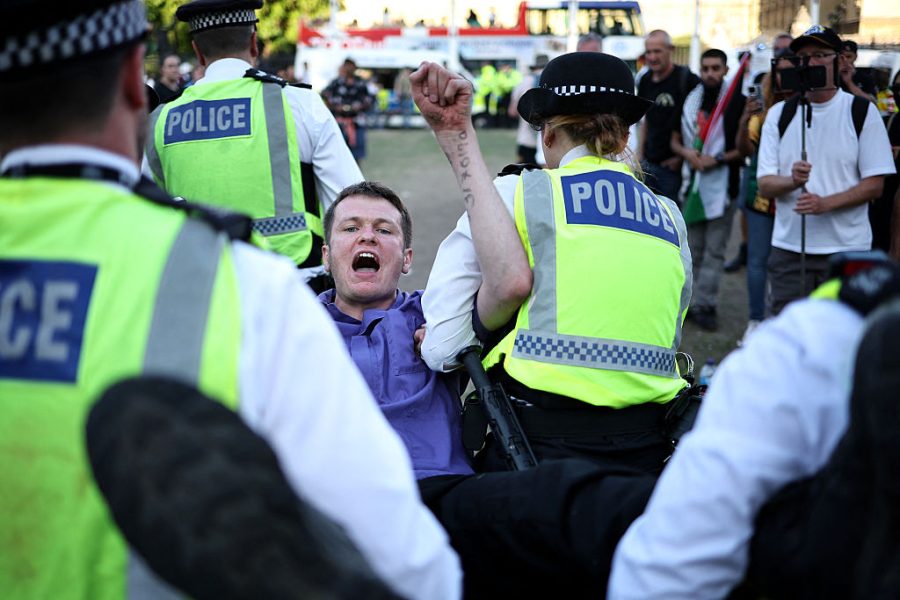Jonathan Porritt’s arrest under the Terrorism Act 2000 is the apogee of a ‘luxury belief.’ Unlike the dozens of other younger people arrested in Westminster on Saturday for supporting the proscribed organisation Palestine Action (PA), Sir Jonathon Espie Porritt, 2nd Baronet CBE is a longstanding member of the administrative and political boss class. He declared himself ‘privileged’ to be nicked with the grandiose pomposity reserved for people who, by age or means, are insulated from any consequences. Others, inspired by their sanctimony, face potentially lifelong consequences for financial independence and freedom of movement, citizenship or employment, whether arrested or convicted.
The decision to prosecute is likely not to be straightforward
The weekend’s protest in front of parliament resulted in a total of 522 arrests for offences against one of our most punitive pieces of legislation. Many commentators, including the front organisation for the mass civil disobedience group ‘Defend our Juries’, had prophesied the collapse of the Metropolitan police, overwhelmed by sheer numbers of defiant activists.
This isn’t quite what transpired – but the admission from the Met that it faced an entirely ‘unrealistic challenge’ to police a few hundred retired teachers and clerics was oddly defeatist. London’s finest were augmented by officers from other forces across England and Wales. They were there in numbers and the approach was proportionate to all the other public order challenges it faces every weekend, as well as the basic requirement to keep neighbourhoods not in the slightest bit interested in events thousands of miles away safe.
Those offered ‘street bail’ after arrest to conserve police numbers around Parliament Square and stop custody suites from collapsing should take no comfort in later defying any conditions attached to their freedom by rejoining the protest, even without placards. The Met will no doubt have deployed huge evidence-gathering resources and long after the transgressive glee has worn off, the knock on the door will come as a shock for many.
We are also yet to see how the judiciary will act as these cases drift along our bunged-up criminal justice system. The decision to prosecute is likely not to be straightforward, as it will surely involve Attorney General Lord Hermer, whose ‘militant’ activism on the side of the human rights industry is well known. Mind you, the decision to proscribe PA in the first place has his fingerprints all over it. The least anyone can routinely expect on conviction for this offence is a high-level community order including a curfew, unpaid work and rehabilitation activity. There is some wiggle room for ‘exceptional circumstances’ to reduce even that penalty but it has to be justified by the court. All eyes on the judiciary then, magistrates in particular.
It’s a pity that those protesting who were not in possession of a public sector pensions or ancestral hauteur were ignorant of new information now emerging about the decision to proscribe PA. It may have given some of them at least pause for thought.
The government has been woefully uncoordinated when it comes to this point, continually sheltering behind the idea of ‘national security’ and a need-to-know basis. While the Home Secretary Yvette Cooper has alluded to PA’s directly anti-Semitic behaviour and links to malign foreign states, these were only made more explicit this morning when justice minister Alex Davies-Jones spelt out the risk of people with perfectly legitimate anger at the plight of Palestinians being manipulated.
It is significant that ‘Defend our Juries’ aren’t committing to facilitating actions similar to last weekend in the future, preferring to say that they will organise protests against the curtailment of freedom of expression. I hope they do because protesting the power of the state is a precious right in a liberal democracy, one that is in fact a bulwark against extremism. The Met, the subject of relentless criticism around under- or overreacting to public order, played the hand they were dealt with well on Saturday. Ministers must now ensure that ordinary citizens with the most to lose understand the malign nature of the organisation they want to sacrifice their life chances for.








Comments